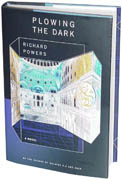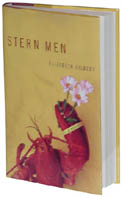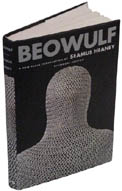|
Plowing the Dark is a novel that attempts to understand all facets and meanings of the computerized information age. The vehicle for this study is The Cavern, a virtual reality room that a team of scientists, artists, and mathematicians are working to build as man's next great invention. What is most noticeable at first is the writing. Powers is excellent, with highly lyrical descriptions of data, circuitry, and graphics; but he gets too descriptive. His intense, poetic style overwhelms the book, leaving nothing to sustain the reader's interest. The characters have generic identities and speak clichéd dialogue that is almost laughable. Also, the author's vast knowledge is overused; there are so many references to science and art that the chunky flow gets further impeded with name dropping. Halfway into this 400-page book, people and plot begin to emerge, and it finally becomes a deep, fascinating page turner. A parallel story about an American hostage in war-torn Beirut is compelling, beautifully written, and gripping to read. We feel every wasted minute of his life ticking away. Slowly the Cavern evolves into an enormous metaphor, encompassing everything from cave paintings, precedents in exploration, art and science, and finally, the human mind. Powers manages to draw all of this together, and the overall reach and concept of the book is vast and impressive. Still, the writing in the first half could have been pared down and remains a frustrating 200 pages attached to a truly unique book. -Craig Beaven
Ruth Thomas is not the typical 18-year-old, holding her breath during the summer after her high school graduation in anticipation of college. Instead, she hangs out on Fort Niles, her tiny hometown island 20 miles off the coast of Maine, trying to figure out some way to stay on the island without becoming a lobster fisher or a housewife to a lobsterman. Elizabeth Gilbert has created a hardy main character in Ruth Thomas, and as the prime catalyst of Stern Men, she is a rogue on an island that wallows in tradition. Because the island is full of eccentrics, Ruth's story burns that much brighter. With the lobster industry and the feud between Fort Niles and its twin island Courne Haven as the backdrop, Gilbert guides us through many surprises in both Ruth's and the island's history to keep the story moving gracefully. Unfortunately, Gilbert is not flawless in her delivery. Occasionally, she leaves us unsatisfied with her fleshing out of Ruth's family history, and the gaps can be glaring. We never find out, for instance, where Ruth's father was for a nine-month period while she lived with the next door neighbors as a young child. As it stands, its mention is just a tease, when it could have advanced the story. Gilbert writes with a strong voice that never plods along, but she gets overly brave with her metaphors in a few instances, weighing the rest of the writing down. She is gifted as a simple prose stylist and should stick to her strengths. -Steven Tweddell
Seamus Heaney's Beowulf is an accessible translation of the epic poem from Old English into contemporary language. Written between the seventh and tenth centuries by an unknown poet, Heaney's heroic narrative retains the original's style, texture, and when possible, alliterative meter. The new Beowulf is still saturated in violence, paganism, early Christian values, and heroic idealism. As the embodiment of God-like courage, Beowulf sails from southern Sweden to Denmark and challenges Grendel, the demonized monster with direct patrilineage to Cain, and Grendel's mother. After returning home, the hero rules the Geats for fifty years until his climactic battle with a dragon. While primary emphasis is placed on the transience of human existence, the psychology of characters is minimal, and as binary opposites, they are categorized as either absolute good or absolute evil. At the request of the editors of The Norton Anthology of English Literature, Heaney modernized the ancient work of art, and to the surprise of many, his Beowulf now appears on National Bestseller lists. But why? Perhaps the poem's chaotic pagan world, which wanes to the structure of heroic idealism and Christianity, is comparable to our pluralistic and increasingly fractured electronic era. Since Nietzsche proclaimed "the Death of God" until the recent postmodern era, fewer readers may believe in an objective reality that explains life's fundamental questions. But, Heaney's more readerly Beowulf relocates fixed meaning and illustrates that security and design are attainable in an ambivalent world. Also, as an updated version of the university requirement, the new Beowulf seems like the academic elite's attempt to maintain its male-dominated literary tradition while suppressing the threat of marginalized groups. -Clint Stivers
|
 PLOWING THE DARK
PLOWING THE DARK  STERN MEN
STERN MEN  BEOWULF
BEOWULF